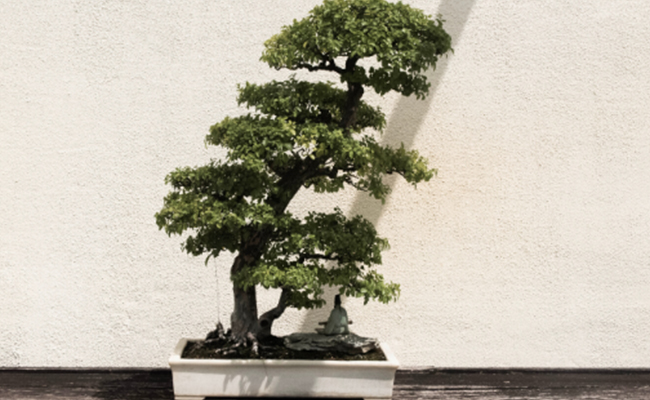Did You Know These Benefits of Bonsai Tree?
Bonsai-- “an art of taking a simple plant or tree and turning it into a reminder of nature’s beauty within a confined space.” In layman language, A Tree in a Pot! The word “Bonsai” is a Japanese word meaning “planted in a container.”
Bonsai is a Japanese art form inspired by the ancient old Chinese art of penjing. It is a thousand-year-old Chinese art of depicting artistically formed trees and plants in miniature. The countries of China and Japan have nurtured, nourished and embraced natural beauty in containers--Bonsai for thousands of years now.
What was once a somewhat restricted discipline is now an evergreen hobby of millions across the globe--cultivating Bonsai. Horticulture techniques like pruning, pinching buds, root reduction, wiring branches, defoliation, and grafting are put into practice to cultivate small trees that imitate the shape and style of fully mature trees.

Furthermore, taking good care of sunlight, water, and fertilizing requirements of Bonsai plants is essential to treasuring the tree of aesthetics and beauty-- Bonsai.
These creatures come in varying types, each unique from one another, yet breathtakingly beautiful.
1. Japanese Maple Tree Bonsai
A Bonsai tree with hand-shaped leaves and bark that becomes greyish brown with age. The tree requires sunlight and air, but must be protected from frost and harsh sunlight rays.
2. Banyan Tree Bonsai
A Bonsai tree with wide branches and emerald green leaves that cascades downwards and also towards the trunk. Humid-climates are the ideal conditions for this tree.
3. Ficus Retusa Tree Bonsai
A resilient Bonsai tree with a striking grey trunk, and round-shaped leaves. In warm climates, it should be kept in partial sun and during cold weather, it should be kept indoors, out of direct sunlight.
4. Crape Myrtle Tree Bonsai
A flowering Bonsai tree that sheds the outer layers of its bark at intervals of time ranging from grey to light pink to rusty brown. The tree prefers full sun for flourishing and flowering.
Plants are wondrous, Bonsai is no exception. Much more for its splendor, Bonsai is avowed for its promising health, spiritual, and scientific benefits.

Let’s heal naturally!!
Bonsai Tree Health Benefits
1. Revel in Calmness: We live in a highly stressful world. We are inflicted with both physical and mental stress. Rather swallowing pills, cultivate a Bonsai tree. That’s the reason you can witness home and office spaces being adorned by a Bonsai tree. Bonsai is a natural stress reliever. Reduction in stress hormone cortisol gives rise to the growth of happy hormones--dopamine, endorphins.
2. Breathe Fresh Air: Gratify yourself and the people surrounding you with the breath of fresh air by cultivating a Bonsai plant. Clean atmosphere and oxidized air are the bonsai benefits that make it a marvelous plant. Living in a purified environment reduces the chances of sore throat, respiratory problems, and other health ailments by 99.9%.
3. Refresh and Rejuvenate: In the Feng Shui practices, Bonsai is noted and respected for its ability to draw refreshing and rejuvenating energies into life. By taking good care of Bonsai plants, you can enjoy the advantages of bonsai like happiness and contentment for life long.
4. Physical and Mental Exercise: Healthy body and mind equal a healthy life. For evincing a robust body and mind, you must exercise them in a playful way. One of the bonsai tree benefits is that it keeps the body and mind engaged. It stimulates awareness, creative thinking, memory learning and keeps fatigue, tiredness at bay.

Bonsai Tree Spiritual Benefits
1. Learn Persistence and Resilience: Bonsai is a tree of persistence and resilience. Bonsai is a plant that flourishes victoriously and beautifully from harsh conditions. Wouldn’t it be great to learn this skill from Bonsai? In life, be like a Bonsai, tenacious and flexible, your scars will add to your beauty.
2. Develop Patience and Kindness: Patience and Kindness are the two bonsai plant benefits that are intangible but are worth adoring. Cultivating a natural wonder requires patience. Rome was not built in a day. Likewise, Bonsai cannot be grown in a day. It demands devotion, undivided attention, care, nourishment over some time before it graces you with its grandeur. As you take care of Bonsai, watering, fertilizing, pruning, you develop patience and kindness in your heart and soul.
3. Become Positive and Optimistic: Positivity is a superpower. One of the bonsai tree advantages is that it makes you positive, hopeful, and optimistic. The process of creating a Bonsai tree requires the nurturer to visualize a positive outcome for the tree. Whenever you fight any battle, you are hopeful for the future. Bonsai is no different. For your health sake, you must practice patience.
4. Inculcate Harmonious Attitude: Harmony is highly valued in the cultures and traditions of Japan. And Bonsai supports the Japanese philosophy of simplicity and harmony at its best worthy manner. Bonsai growers cultivate the tree by creating a unity between shapes and textures that helps in maintaining harmony in nature. As a nourisher and admirer of Bonsai, you inculcate a harmonious attitude.

When you practice harmony, patience, kindness; goodness reigns.
“ The best time to plant a Bonsai was years ago. The second best time is Now.”















